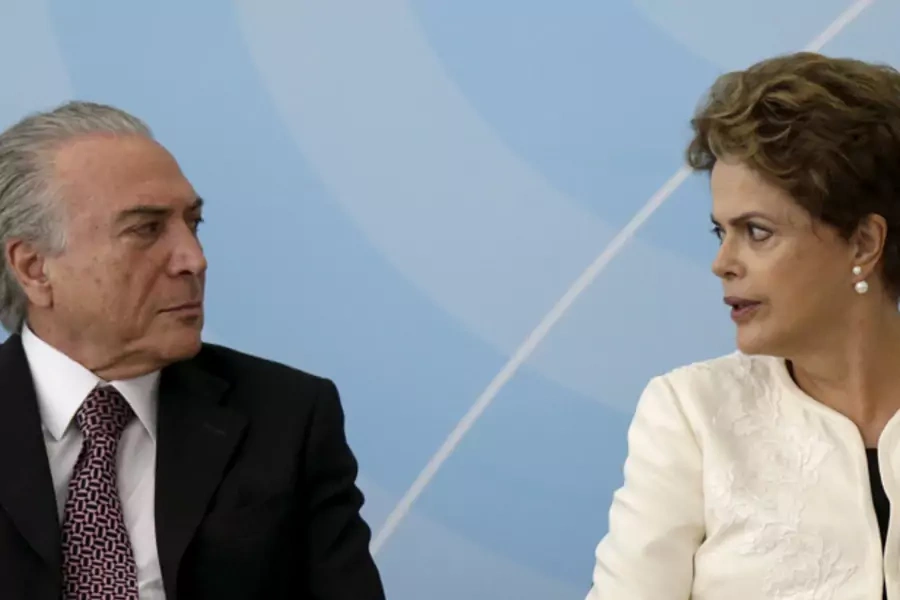Legitimacy and the Battle to Remove Rousseff

More on:
The past week has brought a number of puzzling new feints and jabs in Brasília’s bloody political cage match:
- Most dramatically, reputable news organizations are reporting that President Dilma Rousseff is contemplating resigning from office later this week, despite having spent much of the past year denying that she would ever countenance resignation;
- After months of behind the scenes scheming to break with Rousseff and form his own government, Vice President Michel Temer announced that if he becomes president, he will not run for office again in 2018; and
- Temer agreed to a laundry list of demands from the Brazilian Social Democratic Party (PSDB) as the price of their support.
In the rapidly shifting political landscape of the impeachment drama, these perplexing reports only make sense when seen through the lens of legitimating, or de-legitimating, Rousseff’s removal. All parties are scrambling ahead of what looks like the certainty of a simple majority vote next week that would suspend Rousseff and install Temer as interim president. This week, the Senate special committee will vote on a report on whether or not to proceed to a trial; the Senate floor will then move to a simple majority vote on the trial, with overwhelming chances of approval. This vote would remove Rousseff for 180 days while the trial proceeds. On current trends, if the undecided senators follow the direction of their states and parties in the Chamber of Deputies, there are currently northward of fifty-eight votes for conviction, four more than the two-thirds majority needed.
In the context of what looks—today—like almost certain conviction, Rousseff’s gambit appears to be to make it as hard as possible for Temer to govern with any semblance of legitimacy. Threatening to resign, and calling on Temer to resign alongside her, might be one of the few tactics available to Rousseff and capable of winning widespread public support. Whether or not she is serious about resignation, the mere suggestion that new elections would be more legitimate than impeachment has considerable political effect, especially in light of polls showing that three–fifths of Brazilians would support Temer’s removal. Although the chances of approving the necessary constitutional amendment seem low, calling for new elections is a powerful cudgel. Meanwhile, Rousseff is reported to have choreographed her departure from the Planalto Palace and to be contemplating an international tour to protest the impeachment effort, both of which might produce the desired cloud over the Temer administration.
For his part, Temer is eager to ensure that the bandwagon effect skillfully constructed in the Chamber does not fall apart during the long Senate trial. The hangover that followed the spectacle of impeachment in the Chamber led to a certain buyers’ remorse: Rousseff was punished, but in the process, Brazilians got a closer look at their unpalatable Congress. The horrible spectacle of April 17’s impeachment vote, and the remarkably lopsided result (367 for, 137 against, 9 absent and abstaining) was shocking, even to those long inured to the opportunism of Brazil’s legislators. The governing coalition, many of whom had provided support to the Workers’ Party for the past thirteen years, suddenly turned its daggers on Rousseff. The spectacle was horrendous, demonstrating the opportunism of the congressional “bibles, bullets, and beef” caucuses, and the remarkable hypocrisy of legislators who are deeply implicated in corruption scandals casting votes against a president who is not thought to be personally implicated in corruption (although she faces allegations of having benefited from her party’s campaign finance violations and may soon be placed under investigation by Prosecutor General Ricardo Janot).
As public revulsion with all politicians grows, Temer faces the tough task of keeping the pro-removal coalition intact, while simultaneously building a new administration from the ground up. In tackling these twin challenges, he has had to promise the world, most notably to the PSDB, which had threatened to remain outside the new government. As their price for joining Temer, the PSDB reportedly submitted a long list of demands, ranging from the sensible (a commitment to keep the Lava Jato investigation going), to the unlikely (a commitment to serious tax reform), and the downright fanciful (a commitment to political reform). Why the PSDB would ever expect Temer to fulfill those promises is, of course, moot: the list provides the PSDB with just the veneer of legitimacy they need. Joining the Temer administration is now harder to paint as golpista, and instead is portrayed as a high-minded commitment to the painful and necessary reforms needed to recover from the chaotic Rousseff years. Temer, meanwhile, brings on board an important ally that will help legitimate his very tenuous administration, providing a fig leaf of policy respectability that might otherwise be missing in an administration dominated by the unprincipled Brazilian Democratic Movement Party (PMDB).
There will still be considerable drama surrounding the removal of Rousseff, and the daily news is likely to bring continued surprises and calculated misdirection. But the lens of legitimacy may provide the best analytical perspective on the news emerging from Brasília during the remainder of this turbulent year, in a political environment in which legitimacy is a scarce commodity for all of the major actors.
More on:
 Online Store
Online Store